The world raw material market ended the past trading week (November 17-21) in the red as macro pressure and concerns about oversupply covered many commodity groups. Crude oil became the focus when it lost more than 3%, while agricultural products continued to suffer from double pressure from both supply and demand as well as policy developments. At the end of the week, the MXV-Index decreased by nearly 2%, to 2,303 points.

MXV-Index
Oversupply concerns push oil prices down sharply
According to the Vietnam Commodity Exchange (MXV), the energy group last week witnessed widespread selling pressure, leading the weakening momentum of the entire market. In particular, two crude oil products weakened sharply due to the increasingly obvious risk of oversupply and the strengthening USD.
For the week, WTI crude oil prices fell to $58 per barrel, down more than 3.1%, while Brent crude oil lost more than 2.8% to $62.5 per barrel.
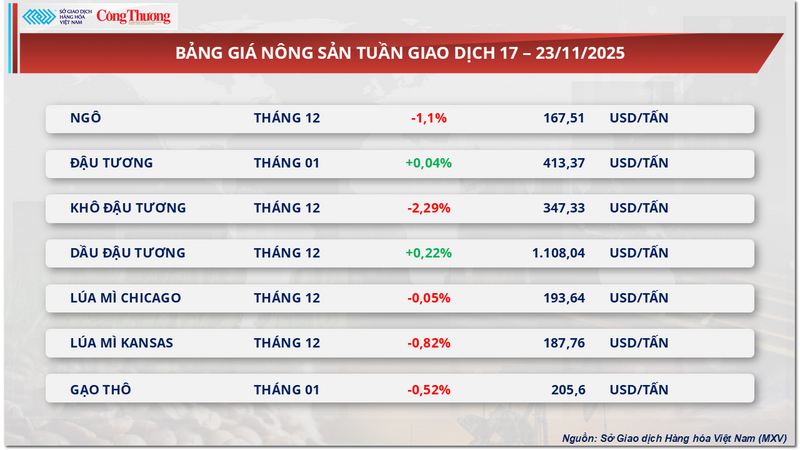
Energy price list
Adding to the geopolitical stakes is the continuing global supply glut. OPEC, the International Energy Agency and Goldman Sachs all agree that 2026 could see a record surplus of up to 4 million barrels per day. In a move to regulate the market, OPEC+ agreed to increase production by 137,000 barrels per day in December, but will pause the increase in the first quarter of 2026. Meanwhile, the US, Brazil and Canada are all expanding production capacity, raising concerns about oversupply. Although attacks on refineries have taken 13-20% of Russia's capacity offline, the damage is not large enough to change the outlook for a surplus in the medium term.
The Dollar Index (DXY) rose to its highest level in five and a half months last week, driven mainly by comments from the Chairman of the US Federal Reserve (Fed), when he said that the agency does not advocate further interest rate cuts for the rest of the year. The stronger USD makes commodities priced in the greenback, including crude oil, less attractive to investors holding other currencies, thereby putting downward pressure on oil prices. In addition, API data recorded a 4.45 million barrel increase in US crude oil inventories, gasoline and distillate inventories also increased against forecasts. Although the US Energy Information Administration (EIA) inventories decreased by 3.43 million barrels, the market is still focused on the weak demand picture.
On the other hand, some geopolitical developments such as Iran’s seizure of an oil tanker in the Gulf of Oman or tensions between the US and Venezuela also provided some support, helping oil prices to narrow the decline in some sessions. However, these factors were not strong enough to reverse the overall downward trend of the market.
Trade flows continue to reflect ample supply, with global tanker inventories reaching 103 million barrels – the highest since June 2024. Notably, China continues to import large amounts of cheap oil, especially from Russia, further adding to the pressure on international markets.
According to MXV, in the short term, oil prices will continue to fluctuate under the impact of geopolitical risks. However, the prospect of oversupply and high interest rates are the main factors that play a guiding role. MXV forecasts that oil prices will likely continue to fluctuate in the range of 58 - 63 USD/barrel.
Agricultural market under great pressure, corn leads the decline
Selling pressure gripped the agricultural market last week, with five out of seven commodities falling. Corn led the way, losing more than 1% to close at $167.50 a ton – its lowest level since late October.
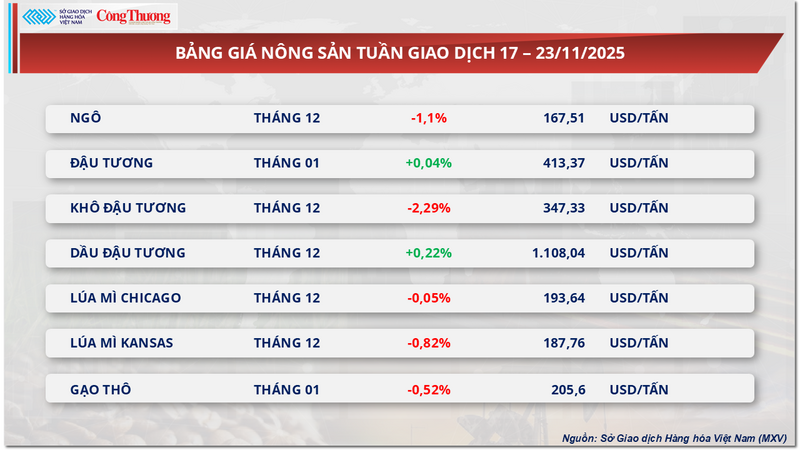
Agricultural product price list
Selling pressure increased sharply in the session on November 20 when corn fell more than 0.7%. Not only corn, the CBOT agricultural market was also submerged in red.
Soybeans fell more than 1.2% at one point, spreading the sell-off to corn and wheat, even though South Korea and China have been increasing their purchases of American corn recently. Notably, the amount of American corn exported to China in the first 10 months of the year fell by 90%, causing even greater selling pressure.
In addition, the DXY index increased nearly 0.9% last week, reducing the competitiveness of US corn. However, the expectation of the FED to cut interest rates after the December meeting is still a factor supporting market sentiment.
On the geopolitical front, positive signals from the Russia-Ukraine conflict have temporarily eased concerns about the security of Black Sea shipping routes, thereby supporting the supply of wheat and corn from the region.
However, the market is still under great pressure from supply when IGC raised its forecast for 2025-2026 corn output to nearly 1.3 billion tons (up 4%), while the US Department of Agriculture (USDA) forecast global output to increase by about 4.5% compared to the previous crop year.
Corn’s decline is being partly tempered by weather risks in South America and the United States. In Buenos Aires, heavy rains have left 70% of the agricultural area flooded or over-wet. Meanwhile, S&P Global Energy forecasts U.S. corn acreage in 2026 will fall to 38.5 million hectares, down 3.8% from 2025.
Demand for ethanol production also contributed to price support. Ethanol production increased nearly 1.5% in the week ending November 14, according to the EIA, indicating that processing activities remained positive. However, the amount of corn used for ethanol in August, according to the USDA, was still down more than 3.3% compared to the same month last year.
Price list of some other goods
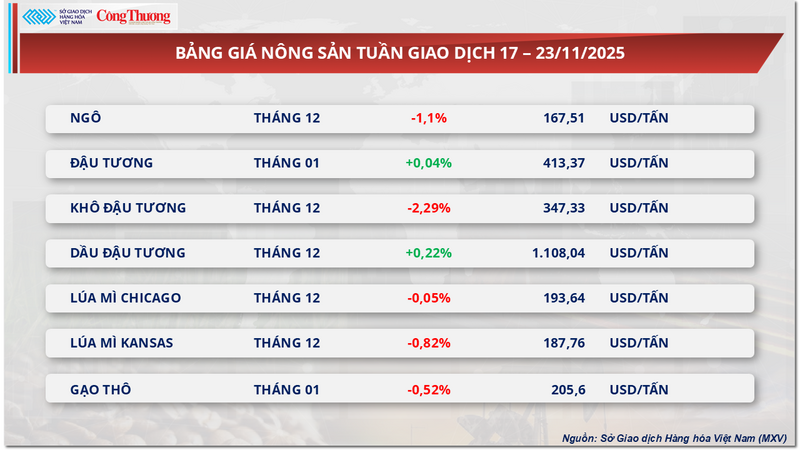
Industrial raw material price list

Agricultural product price list
Source: https://congthuong.vn/gia-dau-giam-manh-ap-luc-ban-phu-kin-thi-truong-nang-luong-431840.html




![[Photo] Next to the "mountain of trash" after the flood, Tuy Hoa residents strive to rebuild their lives](/_next/image?url=https%3A%2F%2Fvphoto.vietnam.vn%2Fthumb%2F1200x675%2Fvietnam%2Fresource%2FIMAGE%2F2025%2F11%2F24%2F1763951389752_image-1-jpg.webp&w=3840&q=75)



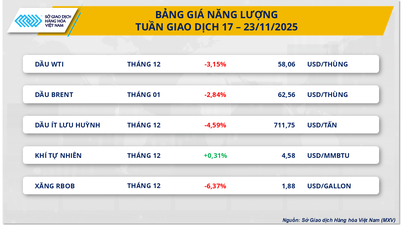




























































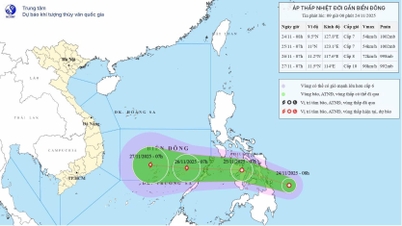





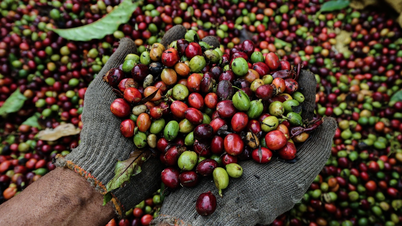































Comment (0)